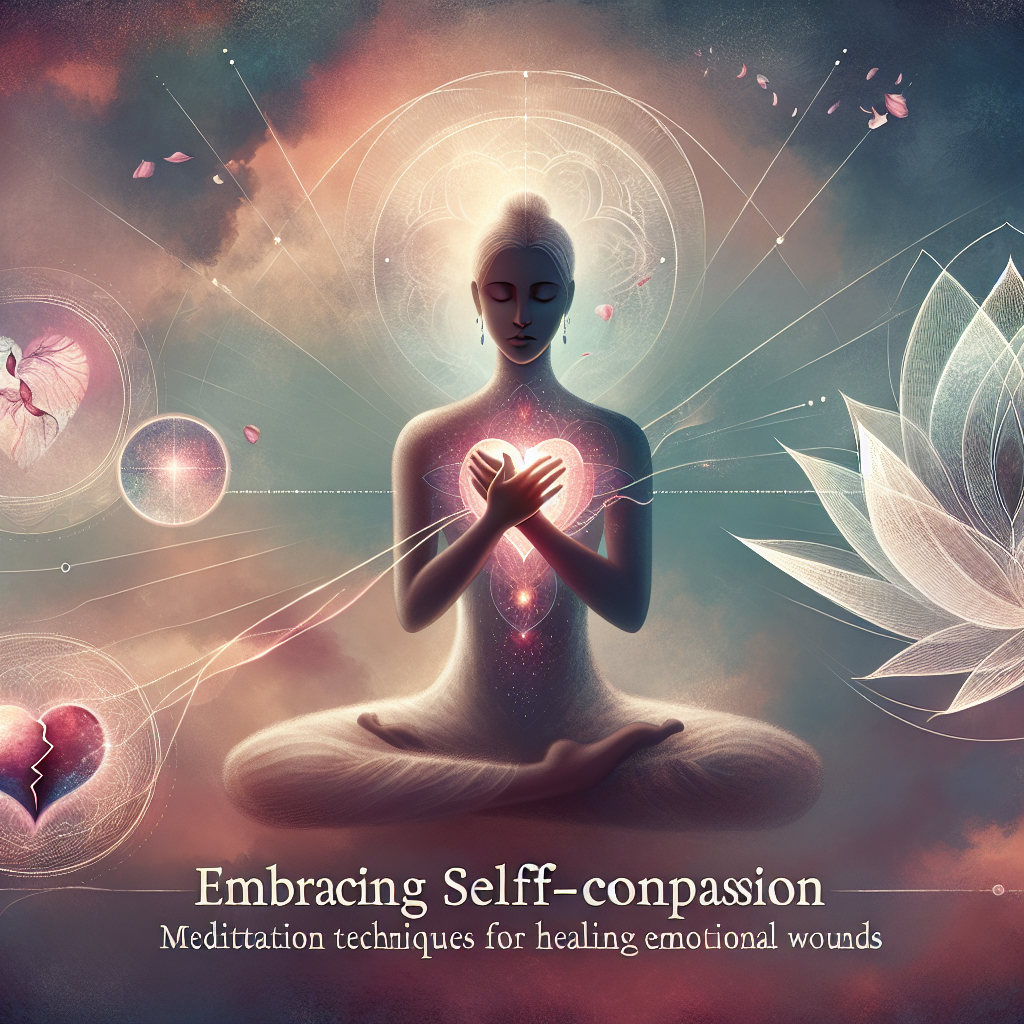Embrace Self-Compassion: meditation Techniques for Healing Emotional Wounds
Self-compassion is a powerful tool for healing emotional wounds and cultivating inner peace. It involves treating yourself with the same kindness, care, and understanding that you would offer to a friend in times of distress. By practicing self-compassion through meditation, you can learn to acknowledge and validate your emotions, quiet your inner critic, and cultivate a sense of acceptance and love for yourself.
Meditation is a practice of focusing your mind and awareness on the present moment, which can help you release negative emotions, reduce stress, and promote self-awareness. By incorporating self-compassion into your meditation practice, you can learn to be more gentle and kind to yourself, allowing your inner wounds to heal and fostering a sense of wholeness and well-being.
Here are some meditation techniques for embracing self-compassion and healing emotional wounds:
1. Loving-kindness meditation: This practice involves sending wishes of love, happiness, and well-being to yourself and others. Begin by sitting in a comfortable position and focusing on your breath. Then, repeat phrases such as “May I be happy, may I be healthy, may I be at peace” while envisioning yourself surrounded by light and love. You can also extend these wishes to others, sending them love and compassion as well.
2. Self-compassion meditation: This practice involves acknowledging and validating your feelings without judgment. Begin by sitting quietly and bringing your attention to your emotions. Notice any negative thoughts or self-criticism that arise and gently redirect your focus to a place of self-compassion. Repeat affirmations such as “I am worthy of love and kindness” or “I am enough just as I am” to cultivate a sense of self-acceptance and compassion.
3. Body scan meditation: This practice involves bringing awareness to the physical sensations in your body, allowing you to release tension and connect with your emotions. Begin by lying down or sitting in a comfortable position and bringing your attention to your breath. Then, systematically scan your body from head to toe, noticing any areas of tension or discomfort. With each exhale, release any negative emotions or energy stored in your body, allowing yourself to relax and heal.
4. Forgiveness meditation: This practice involves letting go of past hurts and resentments, allowing you to free yourself from negative emotions and cultivate a sense of peace and forgiveness. Begin by sitting quietly and bringing to mind someone who has hurt you. Visualize them in your mind’s eye and repeat phrases such as “I forgive you, I release you, I wish you peace” to let go of any anger or resentment you may be holding onto. You can also extend this practice to yourself, forgiving yourself for past mistakes and allowing yourself to move forward with compassion and grace.
5. Gratitude meditation: This practice involves cultivating a sense of gratitude for yourself and others, helping you shift your focus from negative emotions to positive experiences. Begin by sitting in a comfortable position and bringing to mind all the things you are grateful for in your life. This could be your health, your loved ones, or simple moments of joy and beauty. Allow yourself to bask in these feelings of gratitude, allowing them to fill you with a sense of peace and contentment.
Through these meditation techniques, you can learn to embrace self-compassion and heal emotional wounds, allowing yourself to move forward with a sense of peace, acceptance, and love. By practicing self-compassion through meditation, you can learn to be kinder and gentler to yourself, allowing your inner wounds to heal and fostering a sense of wholeness and well-being.
FAQs:
Q: How often should I practice self-compassion meditation?
A: It is recommended to practice self-compassion meditation daily, even for just a few minutes. Consistent practice can help you cultivate a sense of self-compassion and healing over time.
Q: Can self-compassion meditation help with anxiety and depression?
A: Yes, self-compassion meditation can be a beneficial tool for managing anxiety and depression. By acknowledging and validating your emotions with kindness and compassion, you can learn to release negative feelings and cultivate a sense of peace and well-being.
Q: What if I struggle with self-compassion?
A: It is common to struggle with self-compassion, especially if you have a history of self-criticism or low self-esteem. Start by practicing self-compassion meditation in small doses and be gentle with yourself as you learn to cultivate a sense of self-love and acceptance.
Q: How long does it take to see results from self-compassion meditation?
A: It varies from person to person, but many people report feeling a sense of relief and peace after just a few sessions of self-compassion meditation. Consistent practice can help you cultivate a lasting sense of self-compassion and healing over time.
Q: Can I combine self-compassion meditation with other forms of therapy or self-care?
A: Yes, self-compassion meditation can be a powerful complement to other forms of therapy or self-care practices. By incorporating self-compassion into your daily routine, you can enhance your overall well-being and foster a sense of inner peace and healing.




Leave A Comment